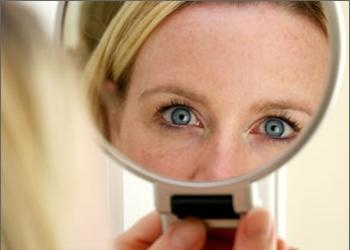Who Are You?

Western society seems obsessed with looking like Hollywood movie stars. It's sad to see middle-aged celebrities whose faces look like something out of a wax museum due to multiple injections and surgeries trying to recapture a fleeting youth.
It's a society where values are based in a glamour fantasy encouraged by television commercials promising fixes for anything and everything. If you want to feel better about yourself—get breast implants. If you want to feel better without having to deal with the problems of life—take an antidepressant. If you don't want to change your lifestyle—get liposuction.
Solutions to life's problems come fast and easy: If you don't like something, just throw it away and get something new and improved—including a new husband or wife. Get more money, get more stuff, and when your face begins to mark time with wrinkles, get Botox.
What are you really looking for?
Let's face it—the trashy, trampy sexuality of pop stars hasn't helped young girls find real happiness in their relationships. And how many times have we seen a young woman wasting away with anorexia or bulimia because her sense of identity is framed by a near-impossible vision of beauty she sees on the big screen?
An Associated Press/MTV poll asked people aged 13-24, "What makes you happy?" What do you think was the number one answer? Friends? Money? Clothes? Drugs? Having a girlfriend? Surprisingly, it was "time spent with family"—quite a different answer than many people would suspect.
Here's something else that might surprise you. Many young people admitted that being sexually active led to being less happy. More than 90 percent said they want to get married some day. The stereotype that teen and young adult sexual freedom leads to happiness just isn't true.
Nearly half the young people polled said that religion and spirituality are very important to them. They also claimed some kind of belief in God and many said that organized religious groups are a source of happiness.
This survey reveals that family relationships and religious beliefs still help shape our sense of self-identity, even among young people.
What about your self-identity?
What can you do to begin to have a healthy self-identity?
First, you need to acknowledge your need for a relationship with your Creator. I don't just mean you need to believe that God exists. Lots of people accept that. The most important question is, Do you trust God enough to let Him guide your life?
Matthew 19 records that a young man came to Jesus and asked, "What good thing shall I do that I may have eternal life?" Jesus answered him, "If you want to enter into life, keep the commandments." The young man replied, "Which ones?"
Jesus told him not to commit violence, not to engage in sex outside of marriage, to be honest, to be truthful in his words and to honor his parents. The young man told Jesus that he had done all these things. Jesus answered, "If you want to be perfect, go, sell what you have and give it to the poor, and you will have treasure in heaven; and come, follow Me."
Because the young man valued money above God, he walked away from Jesus' calling.
Jesus isn't telling you by this to sell all your possessions—as this was a personal requirement meant for a lesson. Jesus is hereby laying out the major priorities God wants in your life. Apply the Ten Commandments to how you treat other people and don't become burdened with the stress of trying to find your identity in money and the things money can buy.
Jesus didn't say to the young man, "Just believe in Me"—He said, "Follow Me." The primary source of a happy self-identity is your acceptance of God as your Father and Jesus Christ as your Teacher.
Build a foundation for healthy relationships
As mentioned, the Associated Press/MTV survey showed that an important source of self-identity is founded in our personal relationships, especially in our families.
Many of us come from dysfunctional families. You may be suffering from deep emotional hurt or hardened by divorce, abuse and neglect. You can either choose to live the rest of your life as a victim, or you can accept the challenge to break the cycle. You can learn the simple rules of healthy relationships and change your life and the lives of others.
Get a Bible and read the Gospel accounts of the life and teachings of Jesus. It's time to let God show you who you really are and the way to a better life! GN
